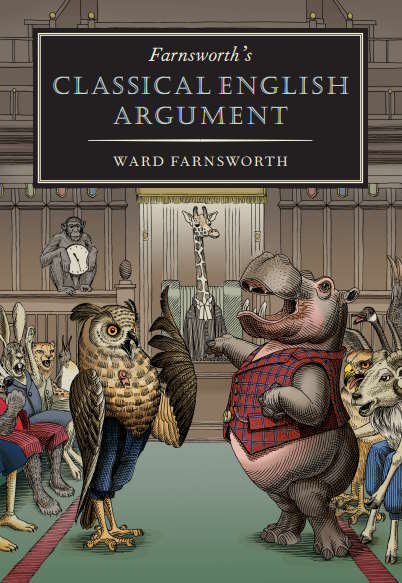

Every household should have a copy.
Interested in philosophy? Try this and this.
Interested in rhetoric? Try this.
Interested in metaphor? Try this.
Interested in law? Try this.
Interested in chess? Try this, and also this, or visit the online version here.
Welcome to the webpage for Classical English Argument.
Learn how to argue from the masters. This book is a course on the art of argument taught by the greatest practitioners of it: Churchill, Lincoln, and hundreds of others from the golden age of debate in England and America. The book’s chapters provide lessons in all aspects of give and take—the syllogism and the slippery slope, the argumentum ad hominem and reductio ad absurdum, the fallacy and the insult. Farnsworth's Classical English Argument shows how the full range of such techniques can be used or repelled, and illustrates them with examples that are fascinating, instructive, and fun to read.
Order the book at amazon.com here or get the audiobook here.
What people are saying about the book:A master class on the art of argument from someone who grades them for a living. You should need a permit to carry it. —Senator John Cornyn (R-TX).
In this brilliant and useful book, Professor Farnsworth brings the spirit of the Stoics to public discourse. It’s set of lessons for the ages—in analysis, rhetoric, civility and wit. —Senator Michael Bennet (D-CO).
The man who composed and orchestrated Farnsworth’s Classical English Argument and its three preceding volumes, is among the few living Americans I know who qualify as truly learned—beyond erudite, deeper, subtler, of greater breadth and wider culture. The only writer I can think to compare him with is Quintilian, the first-century A.D. author of Institutio Oratoria, a work popular in the early years of the Roman empire that took up the subject of education, cited various Greek and Roman writers worthy of study, and provided many insights into human nature and about the value of art. Quintilian, too, deplored the fallen state of rhetoric in his time and wished to revive it. He was the Ward Farnsworth of his day. —Joseph Epstein, Claremont Review of Books
Instructive and entertaining. —Barton Swaim, Wall Street Journal.
An advocate’s toolbox. . . . This is the fourth in a series that is destined to be a mainstay in the libraries of the intelligentsia. —Bryan Garner, Los Angeles Review of Books.
Farnsworth has distinguished himself not just as a prolific writer but also as a good one—a rare combination. . . . A remarkable scholar and a beautiful writer, with a fine sensibility and the energy of a workhorse. —Abdulrahman Bindamnan, Psychology Today.
Farnsworth abides by the Horatian imperative to instruct and delight. . . . What kind of a nerd would dip into a book like this? Writers and speakers interested in improving their argumentation skills. People who want to learn more about how experts in a particular public skill have been successful. Home schoolers, high school teachers, and college professors who want to help their children and students reason more clearly. It belongs in the hands of every politician, publicist, and speechwriter. —Christopher Scalia, Washington Free Beacon.